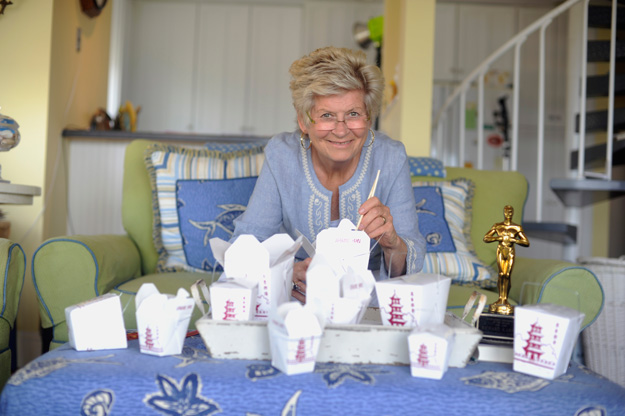Outside the Box

Former Food Network president Judy Girard doesn’t know how to cook.
The executive who retired to Wrightsville Beach in 2008 says she doesn’t have the patience to learn after years of eating take-out in New York City. (She chose to retire here after visiting the area with friends, who happen to be the parents of Wilmington Mayor Bill Saffo). Now here, she relies on prepared foods from Harris Teeter, Fresh Market, and Lovey’s.
But from 1998 to 2004, she led the charge that helped spur the “Foodie Movement,” including the celebrity chef phenomenon.
“Wolfgang (Puck) would fascinate me because his food was so complicated, and he would spend hours and hours cooking,” she says. “Then, he would put it on the plate. And I just never got the eating experience everybody did. I didn’t like all of those tastes together anyway. And I would say, ‘Can you just broil the salmon plain?’”
Despite her sparse palate, Girard found the secret recipe for the Food Network’s success. Shortly after joining the network, she met with chef Julia Child, who was in her early 80s at the time.
“It was really an incredible hour. She was so gracious,” Girard says, adding that she asked Julia Child what made her PBS show so successful.
“She was very clear that it was entertaining, that she has a good time each and every show – that she’s very fallible and makes mistakes all of the time and that’s okay. By the time I walked out of there, I felt like she gave me the formula for the network,” says Girard.
The recipe called for on-air talent, a strong brand, and quality production of entertainment television, she says. The content didn’t matter as much because Child knew that few viewers would actually attempt her recipes at home. Rather, it was the entertainment value she provided that spoke to a wide audience from home cooks to viewers needing a break from television news. Girard took the lesson, and the Food Network flourished.
Its success, however, drew ire from the exclusive food industry.
She fired one of the harshest critics, chef and author Anthony Bourdain. His former Food Network show A Cook’s Tour was cut because its ratings didn’t justify its expense. But they parted amicably, says Girard.
Perhaps not being part of the “food world” freed her to think outside the box with food programming.
“I never really got the eating experience. I always ate on the run at work for so many years. For people to sit down and have a three-hour dinner flabbergasts me … Or those banquets, the James Beard Awards that went on for four hours,” she says. “I’m not a good food person.”
The criticism Girard heard from the food industry echoed an earlier criticism, that time from feminists, while she worked at Lifetime. “They pitched us and prodded us on various movies and shows and movement things, and we never did any of it. It was really uncomfortable,” she says.
Nowadays, she mentors young women in business through the Cameron Executive Network at the University of North Carolina Wilmington. (She and her four-year-old English Labrador, Catalina, also spend time visiting oncology and pediatric patients at New Hanover Regional Medical Center and reading with local school children.)
She advises her mentees to develop self-awareness, to learn how to network without texting and email, and to participate at the conference room table. She shares business lessons learned over 44 years in the television industry.
“For years, I thought you had to be a guy if you were going to work your way up into management. You had to have a certain toughness in the way of communicating. And I tried that for years, and it didn’t work. I finally got high enough that I could be myself. And then, it was easy,” she says.
The only time she says she experienced gender discrimination was when she worked at NBC.
After working on a multimillion-dollar talk show deal for more than a year, she successfully closed the deal. She told her boss who was ecstatic. Together they went to tell the CEO, who invited them to lunch at the executive lunchroom on the 52nd floor of Rockefeller Center. But, Girard says, her boss turned on her and told her she wasn’t invited.
“I was so stunned. It was devastating for me. And I left shortly after, because I thought there’s no way back on this,” she recalls. She left the prestige of NBC and went to work for cable network channels, which were newer and more open to hiring women at executive leadership levels, she says.
The lesson she learned after leaving NBC was that the meaningfulness of the work comes from the people you work with, not the status or perks.
“I didn’t miss the status at all. It was a really good lesson,” she says.
To view more of photographer Jeff Janowski’s work, go to www.jeffjanowski.com.